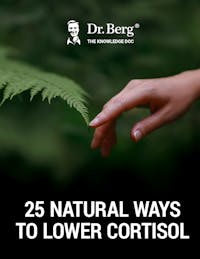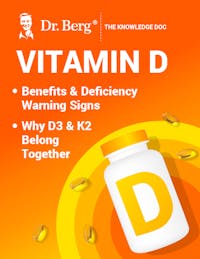Vitamin D and Cortisol: Why Are Their Functions So Similar?

25 Natural Ways to Lower Cortisol
Explore natural methods to reduce cortisol levels
Learn about lifestyle changes, dietary strategies, and relaxation techniques to manage stress
Discover how to balance stress hormones for better health and well-being
Get practical advice for integrating evidence-based stress-reduction practices into your daily life

25 Natural Ways to Lower Cortisol
Explore natural methods to reduce cortisol levels
Learn about lifestyle changes, dietary strategies, and relaxation techniques to manage stress
Discover how to balance stress hormones for better health and well-being
Get practical advice for integrating evidence-based stress-reduction practices into your daily life

25 Natural Ways to Lower Cortisol
Explore natural methods to reduce cortisol levels
Learn about lifestyle changes, dietary strategies, and relaxation techniques to manage stress
Discover how to balance stress hormones for better health and well-being
Get practical advice for integrating evidence-based stress-reduction practices into your daily life

25 Natural Ways to Lower Cortisol
Explore natural methods to reduce cortisol levels
Learn about lifestyle changes, dietary strategies, and relaxation techniques to manage stress
Discover how to balance stress hormones for better health and well-being
Get practical advice for integrating evidence-based stress-reduction practices into your daily life

25 Natural Ways to Lower Cortisol
Explore natural methods to reduce cortisol levels
Learn about lifestyle changes, dietary strategies, and relaxation techniques to manage stress
Discover how to balance stress hormones for better health and well-being
Get practical advice for integrating evidence-based stress-reduction practices into your daily life

25 Natural Ways to Lower Cortisol
Explore natural methods to reduce cortisol levels
Learn about lifestyle changes, dietary strategies, and relaxation techniques to manage stress
Discover how to balance stress hormones for better health and well-being
Get practical advice for integrating evidence-based stress-reduction practices into your daily life

25 Natural Ways to Lower Cortisol
Explore natural methods to reduce cortisol levels
Learn about lifestyle changes, dietary strategies, and relaxation techniques to manage stress
Discover how to balance stress hormones for better health and well-being
Get practical advice for integrating evidence-based stress-reduction practices into your daily life

25 Natural Ways to Lower Cortisol
Explore natural methods to reduce cortisol levels
Learn about lifestyle changes, dietary strategies, and relaxation techniques to manage stress
Discover how to balance stress hormones for better health and well-being
Get practical advice for integrating evidence-based stress-reduction practices into your daily life

25 Natural Ways to Lower Cortisol
Explore natural methods to reduce cortisol levels
Learn about lifestyle changes, dietary strategies, and relaxation techniques to manage stress
Discover how to balance stress hormones for better health and well-being
Get practical advice for integrating evidence-based stress-reduction practices into your daily life

25 Natural Ways to Lower Cortisol
Explore natural methods to reduce cortisol levels
Learn about lifestyle changes, dietary strategies, and relaxation techniques to manage stress
Discover how to balance stress hormones for better health and well-being
Get practical advice for integrating evidence-based stress-reduction practices into your daily life

25 Natural Ways to Lower Cortisol
Explore natural methods to reduce cortisol levels
Learn about lifestyle changes, dietary strategies, and relaxation techniques to manage stress
Discover how to balance stress hormones for better health and well-being
Get practical advice for integrating evidence-based stress-reduction practices into your daily life

25 Natural Ways to Lower Cortisol
Explore natural methods to reduce cortisol levels
Learn about lifestyle changes, dietary strategies, and relaxation techniques to manage stress
Discover how to balance stress hormones for better health and well-being
Get practical advice for integrating evidence-based stress-reduction practices into your daily life

25 Natural Ways to Lower Cortisol
Explore natural methods to reduce cortisol levels
Learn about lifestyle changes, dietary strategies, and relaxation techniques to manage stress
Discover how to balance stress hormones for better health and well-being
Get practical advice for integrating evidence-based stress-reduction practices into your daily life

25 Natural Ways to Lower Cortisol
Explore natural methods to reduce cortisol levels
Learn about lifestyle changes, dietary strategies, and relaxation techniques to manage stress
Discover how to balance stress hormones for better health and well-being
Get practical advice for integrating evidence-based stress-reduction practices into your daily life

25 Natural Ways to Lower Cortisol
Explore natural methods to reduce cortisol levels
Learn about lifestyle changes, dietary strategies, and relaxation techniques to manage stress
Discover how to balance stress hormones for better health and well-being
Get practical advice for integrating evidence-based stress-reduction practices into your daily life

25 Natural Ways to Lower Cortisol
Explore natural methods to reduce cortisol levels
Learn about lifestyle changes, dietary strategies, and relaxation techniques to manage stress
Discover how to balance stress hormones for better health and well-being
Get practical advice for integrating evidence-based stress-reduction practices into your daily life

Vitamin D – Benefits and Deficiency Warning Signs
Learn to recognize early signs of vitamin D deficiency
Discover how to maintain healthy vitamin D levels
Explore common factors that can contribute to vitamin D deficiency
Understand why vitamin D3 and K2 should always be taken together
Get practical advice on how to maximize the health benefits of vitamin D

Vitamin D – Benefits and Deficiency Warning Signs
Learn to recognize early signs of vitamin D deficiency
Discover how to maintain healthy vitamin D levels
Explore common factors that can contribute to vitamin D deficiency
Understand why vitamin D3 and K2 should always be taken together
Get practical advice on how to maximize the health benefits of vitamin D

Vitamin D – Benefits and Deficiency Warning Signs
Learn to recognize early signs of vitamin D deficiency
Discover how to maintain healthy vitamin D levels
Explore common factors that can contribute to vitamin D deficiency
Understand why vitamin D3 and K2 should always be taken together
Get practical advice on how to maximize the health benefits of vitamin D

Vitamin D – Benefits and Deficiency Warning Signs
Learn to recognize early signs of vitamin D deficiency
Discover how to maintain healthy vitamin D levels
Explore common factors that can contribute to vitamin D deficiency
Understand why vitamin D3 and K2 should always be taken together
Get practical advice on how to maximize the health benefits of vitamin D

Vitamin D – Benefits and Deficiency Warning Signs
Learn to recognize early signs of vitamin D deficiency
Discover how to maintain healthy vitamin D levels
Explore common factors that can contribute to vitamin D deficiency
Understand why vitamin D3 and K2 should always be taken together
Get practical advice on how to maximize the health benefits of vitamin D

Vitamin D – Benefits and Deficiency Warning Signs
Learn to recognize early signs of vitamin D deficiency
Discover how to maintain healthy vitamin D levels
Explore common factors that can contribute to vitamin D deficiency
Understand why vitamin D3 and K2 should always be taken together
Get practical advice on how to maximize the health benefits of vitamin D

Vitamin D – Benefits and Deficiency Warning Signs
Learn to recognize early signs of vitamin D deficiency
Discover how to maintain healthy vitamin D levels
Explore common factors that can contribute to vitamin D deficiency
Understand why vitamin D3 and K2 should always be taken together
Get practical advice on how to maximize the health benefits of vitamin D

Vitamin D – Benefits and Deficiency Warning Signs
Learn to recognize early signs of vitamin D deficiency
Discover how to maintain healthy vitamin D levels
Explore common factors that can contribute to vitamin D deficiency
Understand why vitamin D3 and K2 should always be taken together
Get practical advice on how to maximize the health benefits of vitamin D

Vitamin D – Benefits and Deficiency Warning Signs
Learn to recognize early signs of vitamin D deficiency
Discover how to maintain healthy vitamin D levels
Explore common factors that can contribute to vitamin D deficiency
Understand why vitamin D3 and K2 should always be taken together
Get practical advice on how to maximize the health benefits of vitamin D

Vitamin D – Benefits and Deficiency Warning Signs
Learn to recognize early signs of vitamin D deficiency
Discover how to maintain healthy vitamin D levels
Explore common factors that can contribute to vitamin D deficiency
Understand why vitamin D3 and K2 should always be taken together
Get practical advice on how to maximize the health benefits of vitamin D

Vitamin D – Benefits and Deficiency Warning Signs
Learn to recognize early signs of vitamin D deficiency
Discover how to maintain healthy vitamin D levels
Explore common factors that can contribute to vitamin D deficiency
Understand why vitamin D3 and K2 should always be taken together
Get practical advice on how to maximize the health benefits of vitamin D

Vitamin D – Benefits and Deficiency Warning Signs
Learn to recognize early signs of vitamin D deficiency
Discover how to maintain healthy vitamin D levels
Explore common factors that can contribute to vitamin D deficiency
Understand why vitamin D3 and K2 should always be taken together
Get practical advice on how to maximize the health benefits of vitamin D

Vitamin D – Benefits and Deficiency Warning Signs
Learn to recognize early signs of vitamin D deficiency
Discover how to maintain healthy vitamin D levels
Explore common factors that can contribute to vitamin D deficiency
Understand why vitamin D3 and K2 should always be taken together
Get practical advice on how to maximize the health benefits of vitamin D

Vitamin D – Benefits and Deficiency Warning Signs
Learn to recognize early signs of vitamin D deficiency
Discover how to maintain healthy vitamin D levels
Explore common factors that can contribute to vitamin D deficiency
Understand why vitamin D3 and K2 should always be taken together
Get practical advice on how to maximize the health benefits of vitamin D

Vitamin D – Benefits and Deficiency Warning Signs
Learn to recognize early signs of vitamin D deficiency
Discover how to maintain healthy vitamin D levels
Explore common factors that can contribute to vitamin D deficiency
Understand why vitamin D3 and K2 should always be taken together
Get practical advice on how to maximize the health benefits of vitamin D
Vitamin D and Cortisol Why Are Their Functions So Similar?
Let's talk about a duo shaping your health more than you might realize: vitamin D and cortisol. You've probably heard they're essential, but their complex dance can lift or weigh you down.
I know this because I've been there—juggling stress while trying to keep my health in check. These two are deeply connected through the twists and turns of our body’s biochemistry.
This article will scoop on how chronic stress messes with your vitamin D levels, what that means for diseases like MS and type 1 diabetes, and even some tricks to get them both playing nice again—from adaptogens to lifestyle tweaks.
Stick around; it's going to be enlightening!
The Stress-Vitamin D Connection: Understanding the Basics
Think of your body like a high-stakes game of resource management. Under chronic stress, it's as if your inner factory slows down vitamin D production to keep up with the demand for cortisol.
It turns out that when you're stressed to the max, your gut absorption of vitamin D takes a hit.
Now, here's where cholesterol enters the chat. Cholesterol is not just something doctors warn about; it’s also a building block for vitamin D and cortisol. Your body has to decide—does it use this ingredient to chill out or bone up on calcium?
If we peek into our cells during stressful times, they might hoard cholesterol to produce more cortisol than Vitamin D—which can mess with our overall health.
Cortisol's Effects on Immunity and Autoimmune Diseases
Think of cortisol as the body's built-in alarm system. It's crucial for survival, but when it blares non-stop due to chronic stress, it can leave your immune defenses in shambles.
This hormone, known for its role in the fight-or-flight response, can suppress your immune system when levels stay elevated.
This means you're more open to uninvited guests like infections since cortisol curbs the troops—your white blood cells—from doing their job effectively.
The Link Between Stress, Cortisol, and Autoimmune Diseases
It gets trickier with autoimmune diseases where your body mistakenly attacks itself.
When life keeps throwing curveballs, causing persistent stress and spiking those cortisol levels high enough to reach space station orbiting altitudes—they could potentially contribute to launching an autoimmune condition into existence.
Diseases such as multiple sclerosis (MS) or type 1 diabetes might find a way through this compromised defense line—a stark reminder that managing stress isn't just about feeling good; it’s also vital in keeping our internal security systems robust.

Managing Autoimmune Diseases with Synthetic Cortisol
Prednisone, a synthetic cortisol counterpart, often steps into the ring when your body's immune system turns against itself. Just like a referee in a boxing match, it works to maintain order, calming down that internal squabble known as autoimmune disease.
Here's the scoop: our bodies naturally produce cortisol through the adrenal glands—our built-in stress buffer and inflammation buster.
But sometimes, we need more muscle—that's where prednisone comes into play. It mimics natural cortisol but packs a bigger punch to keep those overzealous immune cells at bay.
If you're navigating this tricky terrain of autoimmunity, prednisone might be your ticket to reigning in symptoms and regaining balance.
The Inflammatory Response and Cortisol Resistance
When your body feels like it's battling a bear, cortisol resistance can sneak up on you. Think of it as your cells slamming the door in cortisol's face, refusing to let this stress hormone do its job. This stubborn refusal may kick-start inflammation throughout the body.
Meanwhile, vitamin D steps into the fray with its anti-inflammatory cape on. It’s not just good for bones; it helps cool down those inflammatory fires that can flare up in autoimmune conditions.
If you’re dealing with an unyielding immune system, consider reaching out for more sunlight or supplementing with vitamin D.
This sunshine nutrient might just be what your body needs to return to feeling less like a battleground and more like a peaceful sanctuary.
Factors Influencing Vitamin D Absorption
Vitamin D, the sunshine vitamin, isn't always a walk in the park to soak up. Think of your body as a complex machine that needs specific settings to run smoothly.
For starters, genetic makeup can be a bit of a gatekeeper regarding how much vitamin D you can use from what you get.
As we age, our bodies don't catch rays quite like they used to. It's like having an old antenna for your TV—sometimes you need to adjust it more often.
And if you have darker skin, it's akin to wearing sunglasses; less sunlight gets through, which means less vitamin D is absorbed.
Is lounging indoors too much? Lack of sun exposure is another roadblock—and let’s not forget about insulin resistance—it’s throwing a wrench into the gears of vitamin absorption machinery. Each one plays its part in this absorption problem, keeping us on our toes.

Essential Nutrients for Vitamin D Absorption and Cortisol Regulation
Magnesium and zinc aren't just minerals; they're the unsung heroes in your body's daily drama of vitamin D absorption and cortisol regulation. Without enough magnesium, your body would be like a car without gas when converting vitamin D into its active form.
And zinc? It’s the co-pilot, ensuring your immune system isn’t hijacked by stress hormones running amok. Research shows that maintaining adequate levels of these minerals is crucial for bone health and keeping those pesky stress hormones at bay.
Think about it: When you're stressed out, your adrenal glands go into overdrive, producing cortisol, which can block vitamin D receptors.
But with magnesium steering the ship and zinc standing guard, you have a fighting chance against stress-induced nutritional deficiencies.
If more sunshine isn't enough to boost your mood or immunity, peek inside your pantry—it might be time to call on these nutrient powerhouses for backup.
Holistic Approaches to Lowering Cortisol and Boosting Vitamin D
Stress is like a nosy neighbor for your body, always poking its head in where it's not wanted. And when cortisol levels spike from stress, they can rob you of much-needed vitamin D absorption.
Adaptogens are the peacekeepers here; consider them the friendly neighborhood watch that keeps cortisol in check. Herbs like ashwagandha have been shown to help lower stress responses, potentially making more room for vitamin D uptake.
If Adaptogens were a baseball team, they'd be batting home runs for your health. Moving on to lifestyle changes: exercise doesn't just sculpt muscles; it helps hammer down cortisol too.
But don't forget sleep - quality Zs can act as a silencer for stress signals and an enhancer for hormone balance. Toss in some dietary tweaks—think fatty fish high in omega-3s—and you have a solid game plan against excess cortisol while nudging up those vitamin D levels.
Conclusion
Wrapping it up, let's revisit the key points. Stress affects your body and can mess with vitamin D absorption. Remember how both vitamin D and cortisol start from cholesterol? That's vital.
Digging deeper, we saw that cortisol might put your immune system on the bench, opening doors for pesky infections and even autoimmune conditions like MS or type 1 diabetes.
Talking treatment, synthetic cortisol steps in as Prednisone to calm those autoimmune flare-ups. But there's this tricky thing called cortisol resistance—it could fan inflammation’s flames unless you bring in Vitamin D’s anti-inflammatory assist.
To tie it all together, managing stress is crucial for balancing our health equation. The Vitamin D and Cortisol relationship plays a massive role here; knowing their dance helps us step wisely—whether through nutrients like magnesium and zinc or life changes promoting hormonal harmony.
Supporting Data
https://www.ncbi.nlm.nih.gov/pmc/articles/PMC4973406/
https://f1000research.com/articles/3-155
https://www.frontiersin.org/articles/10.3389/fendo.2022.1001065/full
https://www.sciencedirect.com/science/article/abs/pii/S096007601830520X
Previous blog
4 Ways to Lower Your Risk of Cataracts
Popular
08/21/2024
55K views
02/23/2025
46.3K views
11/18/2024
277.5K views
03/18/2024
11/21/2022




